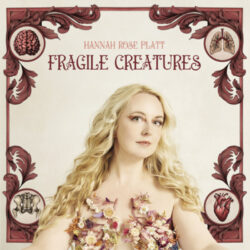Stirring, intrepid journey into the medicine, myth and mystery of women’s history.
 Having released two solid (if traditional-sounding) singer-songwriter albums, Hannah Rose Platt swerved away from anything remotely conventional with 2023’s album ‘Deathbed Confessions’. Our review noted that it was a “seismic step forward… with a suite of songs able to intrigue and disturb in equal measure”. Released soon after, the ‘Hypnogogia’ EP continued her left-field trajectory with a collection of distinctly unsettling ghost stories.
Having released two solid (if traditional-sounding) singer-songwriter albums, Hannah Rose Platt swerved away from anything remotely conventional with 2023’s album ‘Deathbed Confessions’. Our review noted that it was a “seismic step forward… with a suite of songs able to intrigue and disturb in equal measure”. Released soon after, the ‘Hypnogogia’ EP continued her left-field trajectory with a collection of distinctly unsettling ghost stories.
Now comes ‘Fragile Creatures’, an album that simultaneously dives deeper and soars higher than what has come before. Its subject matter seemingly touches on every aspect of women’s experience over the past two centuries and before. Opener ‘Ataraxia’ sets the scene immediately, as a woman’s monotone voice appears to quote a marital guidebook from another age. “Remember, the important element in a man’s happiness is admiration from his wife…you must become the fragile, dependent creature nature intended you to be” (n.b. “atarexia” is defined as a serene state of calmness). Platt’s voice comes in as a soft lullaby; but shot through the swooning melody is an underlying, uneasy awareness that all is not as it should be, and the picket fence 1950’s dreamworld that is depicted feels like it may soon get a David Lynch-ian makeover, and give way to something which the unwitting patriarchy may find less than palatable.
There are some extraordinary tales here, featuring intricate and beautifully observed storytelling. From the ancient midwife going about her business in ‘Curious Mixtures’, to the miraculous story of ‘Rest in Persistence (Anthem to Anne Greene)’, which gets inside the true story of Greene, a young woman convicted (almost certainly wrongly) of infanticide in 1650. Hanged, her body is placed in its coffin, and handed over to physicians for dissection. However, the following day, they detect a faint pulse, and with some close care, she makes a full recovery, and goes on to live a full life after, even keeping her coffin as a souvenir. It is hardly common fare for a 21st-century songwriter, but Platt inhabits the story with some verve.
The music itself is frequently transcendent, whether it is swooping majestically on banks of strings and choral voices, coming down to earth with sing-song lullabies, or even skewing wildly with martial beats and distorted vocals (‘The Yellow Paper”, “La Grande Hysteria”). The musical influence of producer Ed Harcourt here (and indeed on her other recent work) feels evident. Harcourt has long been a songwriter who veered away from the simplistic, and has always been as likely to embrace the likes of Brecht or neo-classical influences as he is to draw on classic pop songwriting. Together, they have created a perfect sonic backdrop for these intense and curious songs.
Every track here could have an essay dedicated to it; it is an extraordinary endeavour. Platt gives credit to the inspiration she drew from the “fascinating and enraging” stories in Elinor Cleghorn’s book ‘Unwell Women’, a historical account of the abuse or maltreatment of women at the hands of misogynistic medical practices. She draws on multiple perspectives to examine similar themes in her songs, while paying tribute to “the strength, resilience, and rebelliousness of women through the ages”.
‘Fragile Creatures’ is an important record for all times. It is full of subtle nuance throughout, and can only be recommended as a musical and storytelling tour de force. It is an immersive experience from a major and unique talent, which should be listened to closely and savoured, not just for the hard truths within, but for the inspiration and hope it brings.


